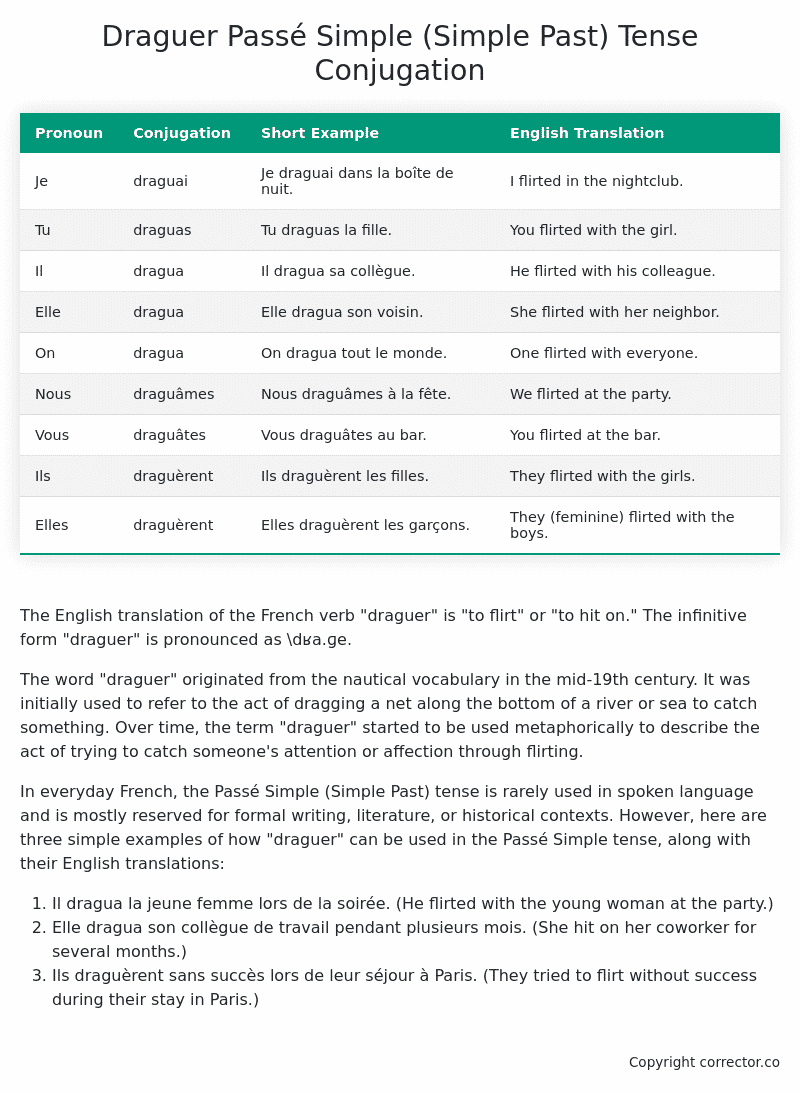Passé Simple (Simple Past) Tense Conjugation of the French Verb draguer
Introduction to the verb draguer
The English translation of the French verb “draguer” is “to flirt” or “to hit on.” The infinitive form “draguer” is pronounced as \dʁa.ɡe.
The word “draguer” originated from the nautical vocabulary in the mid-19th century. It was initially used to refer to the act of dragging a net along the bottom of a river or sea to catch something. Over time, the term “draguer” started to be used metaphorically to describe the act of trying to catch someone’s attention or affection through flirting.
In everyday French, the Passé Simple (Simple Past) tense is rarely used in spoken language and is mostly reserved for formal writing, literature, or historical contexts. However, here are three simple examples of how “draguer” can be used in the Passé Simple tense, along with their English translations:
- Il dragua la jeune femme lors de la soirée. (He flirted with the young woman at the party.)
- Elle dragua son collègue de travail pendant plusieurs mois. (She hit on her coworker for several months.)
- Ils draguèrent sans succès lors de leur séjour à Paris. (They tried to flirt without success during their stay in Paris.)
Table of the Passé Simple (Simple Past) Tense Conjugation of draguer
| Pronoun | Conjugation | Short Example | English Translation |
|---|---|---|---|
| Je | draguai | Je draguai dans la boîte de nuit. | I flirted in the nightclub. |
| Tu | draguas | Tu draguas la fille. | You flirted with the girl. |
| Il | dragua | Il dragua sa collègue. | He flirted with his colleague. |
| Elle | dragua | Elle dragua son voisin. | She flirted with her neighbor. |
| On | dragua | On dragua tout le monde. | One flirted with everyone. |
| Nous | draguâmes | Nous draguâmes à la fête. | We flirted at the party. |
| Vous | draguâtes | Vous draguâtes au bar. | You flirted at the bar. |
| Ils | draguèrent | Ils draguèrent les filles. | They flirted with the girls. |
| Elles | draguèrent | Elles draguèrent les garçons. | They (feminine) flirted with the boys. |
Other Conjugations for Draguer.
Le Present (Present Tense) Conjugation of the French Verb draguer
Imparfait (Imperfect) Tense Conjugation of the French Verb draguer
Passé Simple (Simple Past) Tense Conjugation of the French Verb draguer (You’re reading it right now!)
Passé Composé (Present Perfect) Tense Conjugation of the French Verb draguer
Futur Simple (Simple Future) Tense Conjugation of the French Verb draguer
Futur Proche (Near Future) Tense Conjugation of the French Verb draguer
Plus-que-parfait (Pluperfect) Tense Conjugation of the French Verb draguer
Passé Antérieur (Past Anterior) Tense Conjugation of the French Verb draguer
Futur Antérieur (Future Anterior) Tense Conjugation of the French Verb draguer
Subjonctif Présent (Subjunctive Present) Tense Conjugation of the French Verb draguer
Subjonctif Passé (Subjunctive Past) Tense Conjugation of the French Verb draguer
Subjonctif Imparfait (Subjunctive Imperfect) Tense Conjugation of the French Verb draguer
Subjonctif Plus-que-parfait (Subjunctive Pluperfect) Tense Conjugation of the French Verb draguer
Conditionnel Présent (Conditional Present) Tense Conjugation of the French Verb draguer
Conditionnel Passé (Conditional Past) Tense Conjugation of the French Verb draguer
Conditionnel Passé II (Conditional Past II) Tense Conjugation of the French Verb draguer
L’impératif Présent (Imperative Present) Tense Conjugation of the French Verb draguer
L’impératif Passé (Imperative Past) Tense Conjugation of the French Verb draguer
L’infinitif Présent (Infinitive Present) Tense Conjugation of the French Verb draguer
L’infinitif Passé (Infinitive Past) Tense Conjugation of the French Verb draguer
Le Participe Présent (Present Participle) Tense Conjugation of the French Verb draguer
Le Participe Passé (Past Participle) Tense Conjugation of the French Verb draguer
Struggling with French verbs or the language in general? Why not use our free French Grammar Checker – no registration required!
Get a FREE Download Study Sheet of this Conjugation 🔥
Simply right click the image below, click “save image” and get your free reference for the draguer Passé Simple tense conjugation!

Draguer – About the French Passé Simple (Simple Past) Tense
Formation
Usage
Narration
Historical Context
Interactions with other tenses
Passé Composé
Imparfait
Conditional and Subjunctive
Summary
I hope you enjoyed this article on the verb draguer. Still in a learning mood? Check out another TOTALLY random French verb conjugation!


